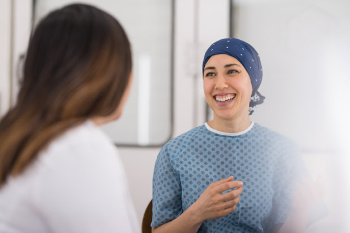
Sexual function can be difficult after breast cancer treatment. (Learn more.) Many women feel little desire for sex or have trouble becoming lubricated enough for comfortable intercourse. They might have more trouble reaching orgasm than they did before having cancer. And emotional factors, like depression and poor body image, can influence sexuality as well.
Now, research suggests that phobic anxiety contributes to such issues, too.
You’ve probably heard the term phobia. The Anxiety and Depression Association of America defines phobia as a “strong irrational fear.” People with phobias are afraid of an object or activity, even though they know it poses no serious threat. They may try to avoid those objects or activities.
In September 2018, the journal Psycho-Oncology published a study of sixty women. Thirty women (average age 57) had been treated for breast cancer and had finished their treatment at least a year beforehand. The other group (average age 53) had no history of breast cancer.
The women completed a questionnaire called the Female Sexual Function Index (FSFI), which assesses sexual desire, arousal, vaginal lubrication, orgasm, satisfaction and pain during the previous four weeks.
Anxiety levels were also evaluated with an assessment tool. Women responded to questions about the types of anxiety they experienced, including phobic anxiety. (Other types included anxiety about evaluation, interpersonal anxiety, and anxiety in everyday situations.)
Roughly three-quarters of the survivors had had chemotherapy or radiation therapy. Sixty percent had undergone hormonal therapy, and about half had had breast-conserving surgery.
Overall, 89% of the breast cancer survivors were considered to have sexual dysfunction, compared to 46% of the women without a history of breast cancer.
The researchers found that phobic anxiety in particular was associated with poorer sexual function in survivors based on FSFI scores.
“Most of the survivors had undergone chemotherapy, which is more likely than many other medical treatments to increase sexual dysfunction, so it is possible that the consequences of breast cancer that affect survivors’ perceptions of their femininity may also affect their sexual functioning by inducing a phobic response to intimacy and sexual relations,” the authors wrote.
Cancer survivors who feel anxious about sex are encouraged to talk to their healthcare provider.
Learn more with these links:
Breast Cancer Survivors Face Sexual Concerns
Female Cancer Survivors and Sex Health Issues
Cancer and Sexuality: Questions For Your Provider
Breast Cancer Treatment Could Preserve Ovarian Function
Younger Breast Cancer Survivors Have Sexual Challenges, Too
Special Therapy Addresses Body Image in Breast Cancer Survivors
Sexuality of Older Cancer Survivors
Resources
Anxiety and Depression Association of America
“Specific Phobias”
https://adaa.org/understanding-anxiety/specific-phobias
Eurekalert!
“Phobic anxiety is linked to sexuality issues in women who are breast cancer survivors”
(November 5, 2018)
https://eurekalert.org/pub_releases/2018-11/uoc-pai110518.php
Psycho-Oncology
Abril‐Requena, Ana, et al.
“Sexual dysfunction and phobic anxiety in breast cancer survivors”
(Full-text. First published: September 17, 2018)
You may also be interested in...
Other Popular Articles

What Is Jelqing, and Does It Actually Work?
The term “jelqing” refers to a set of penis stretching exercises that some believe can make the penis bigger. Although the practice has gained attention and popularity in blogs and internet forums in recent years, there is no scientific evidence that it is an effective way to permanently increase the size of one’s penis. In fact, in some cases, jelqing may actually cause damage to the penis, so it is a good idea to get all the facts before setting off to try it.

What Is Sensate Focus and How Does It Work?
Sensate focus is a technique used to improve intimacy and communication between partners around sex, reduce sexual performance anxiety, and shift away from ingrained, goal-oriented sexual patterns that may not be serving a couple.

What Is the Average Penis Size?
If you have ever wondered how your penis compares to others in terms of size, you are not alone. Many men are curious to know how their penises stack up compared to the average. Unfortunately, general curiosity can sometimes give way to full-on obsession and anxiety about penis size. This can be an unhealthy and often unnecessary fixation, especially because most men who think their penises are too small have perfectly normal-sized penises.

Can Sex Reduce Menstrual Cramps?
The SMSNA periodically receives and publishes ‘guest editorials.’ The current article was submitted by Mia Barnes, a freelance writer and researcher who specializes in women's health, wellness, and healthy living. She is the Founder and Editor-in-Chief of Body+Mind Magazine.
Having sex while you experience menstrual cramps is healthy and can provide significant benefits. While it might not be the first activity that comes to mind when your PMS or period cramping begins, many people enjoy sex to reduce menstrual cramps, experience increased pleasure and benefit from other advantages. Learn more about having sex while menstrual cramps are happening and how it can help your body.

What Is Edging and Why Do People Do It?
Edging is the practice of stopping sexual stimulation before reaching orgasm to prolong a sexual experience. The term stems from the concept of approaching the metaphorical “edge” of orgasm but stopping before going over the edge.

The Effect of Regular Aerobic Exercise on Erectile Function
Erectile dysfunction (ED) is the inability to achieve or maintain an erection sufficient for satisfactory sexual activity. As men get older, their erectile functioning may naturally decline due to changes in testosterone levels, cardiovascular functioning, and the potential development of other chronic medical conditions that become more common with age.

